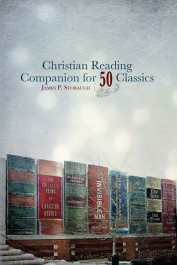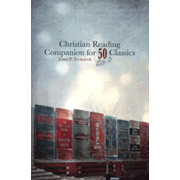James Stobaugh has written a number of courses for the study of literature, the latest of which is a series published by Master Books that includes courses in American, British, and World Literature. (See my review here.) While those courses require students to read entire books as well as shorter works, Stobaugh believes there are many more books students should read to become truly educated. While there is some overlap between those books selected for Christian Reading Companion and the three courses, the style of treatment is entirely different.
Christian Reading Companion is to be used as a supplement rather than a course on its own. Students in the middle grades through high school might embark on a reading program in any order they wish. To make it a little easier to select appropriate works, Stobaugh has broken his 50 selections down into two lists found on pages 278 and 279; the first list could be started by students as young as middle school while the second list should be reserved for high school.
Christian Reading Companion is much more than lists of recommended books. For each book, Stobaugh begins with a brief introduction and synopsis. Next are five multiple-choice questions. Following that are suggested vocabulary words presented in context within quotations from the literature. Students might create vocabulary study cards for those words with which they are not familiar although it’s totally up to you as to how to use the vocabulary words. The “study” of each literary work concludes with a set of discussion questions.
The book is divided into two main sections. The first section contains what I’ve described above for each of the 50 literary works. The second section is the teacher’s answer key with answers for multiple-choice questions, brief definitions for the featured vocabulary words, and suggested answers for the discussion questions.
The suggested answers might allow parents to discuss a literary work with their student, but parents will likely be at a loss if the discussion veers away from the predicted answers. Because of this, it is almost always going to be more productive if parents are able to read the books too. If that’s not possible, discussion questions might be used as essay questions to give parents more time to evaluate answers. However, the value of discussing a great book cannot be underestimated, while having to write about it might have a negative motivational effect.
Christian Reading Companion can be used by those with or without particular religious views. While it sometimes asks questions that prompt students to think in terms of beliefs and worldviews, it doesn't promote a Christian worldview. The only question I spotted that presumes biblical literacy was, "Contrast Machiavelli's view of leadership with biblical views of leadership" (p.109).
The 50 literary works selected for Christian Reading Companion include a healthy representation from the Great Books list as well as a selection of other books and plays that would likely show up on “Good Books” lists. You won’t find Harry Potter or The Hunger Games amidst them although you will find some contemporary works like The Hiding Place by Corrie ten Boom and The Old Man and the Boy by Robert Ruark. Examples of other works included are Black Beauty, The Hound of the Baskervilles, “Julius Caesar” (Shakespeare), Madame Bovary, Les Miserables, The Prince, The Song of Roland, 20,000 Leagues Under the Sea, Utopia, Walden, and Wuthering Heights.
As Stobaugh acknowledges at the beginning of his book, the selection is arbitrary and limited given the vast number of good books that might have been included. Of the books included, I spotted only one that I personally couldn’t get through—The House of the Seven Gables. Overall, I think he has selected an excellent sampling of works that are likely to have broad appeal and are well worth reading and discussing.










